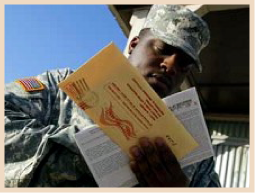
Todd Jay Leonard, Blog


With tomorrow's big election in the United States scheduled to take place, I thought it appropriate to write about the Japanese system of elections.
A reader recently wrote to ask if I am allowed to vote in Japan and if I take the time to vote in the U.S.
I am not a Japanese citizen, so I do not have the right to vote in Japan. I do have "permanent residency" which means I have permission to live here indefinitely. When I first came to Japan, I was on a "professor's visa" which had to be renewed every three years.
My status as "permanent resident" allows me to come and go, to and from Japan as I wish without worrying about a visa. However, this does not mean that I have Japanese citizenship, so, therefore, I cannot vote. I carry a U.S. passport and I am still 100 percent American - I just happen to live in Japan and have done so for nearly 20 years. I have no intention of immigrating to Japan and becoming, in essence, "Japanese."
Many people back home, not understanding clearly immigration and permanent resident issues, ask me if I have given up my U.S. citizenship because of the length of time I have lived in Japan.
This is not something I have ever entertained. I am happy being American; I just like living and working in Japan. I do see myself after retirement dividing my time between the two countries - one foot in Japan and the other in the United States. I am a Hoosier, tried and true, and do keep a tight grip on my Indiana roots.
However, there are a growing number of expatriates living in Japan who do, in fact, opt to take Japanese citizenship, hence becoming Japanese. I will write about this in a future column, as a reader recently wrote asking about immigration in Japan.
Back to this week's topic voting and elections. I do vote by absentee ballot in U.S. elections. The Shelby County Election Board does a magnificent job in making sure I get my ballot in enough time to get it back to Shelbyville before the election takes place. I voted more than a month ago, and my ballot is snugly stored at the courthouse awaiting tomorrow's election.
I have never missed voting in a national election, and I honestly can't remember missing a local election. I feel strongly that in a democracy it is each citizen's obligation to cast a vote in order to be heard. Hence, if I don't like how politicians are running things, I feel I have every right to voice my displeasure, because by voting I have a stake in the process and outcome.
Just like in the United States, Japan normally has a low voter turnout. I guess people become complacent and figure that one vote can't make that much of a difference and, therefore, choose not to be heard. As we have seen in the U.S., indeed every vote does count and can make a huge difference in an outcome.
The national election system in Japan has been in place since the late 1890s. Of course, like most countries around the world, including the U.S., it limited voting to a narrow portion of the entire population.
At that time, only adult males who paid annual taxes in a predetermined amount could vote. In the 1920s, the right to vote was expanded to all males 25 years of age or older. Shortly after World War II, universal suffrage was adopted allowing all the right to vote, including women.
The current system in Japan has been in place since 1950, a combination of prewar practice and revised postwar additions. Today, all Japanese citizens the age of 20 or older have the right to vote; there is a three-month residency requirement if voting in local elections.
The Japanese nationally elected body, collectively, is called the "Diet." It is the highest authority of state power and is charged with the duty of making laws for Japan. The Diet consists of two chambers: the House of Representatives (lower house) and the House of Councillors (upper house). All members of the Diet are elected through a popular vote by Japanese citizens.
Unlike in the U.S. where the president is elected directly by the people, the prime minister of Japan is a member of the ruling party and is selected by majority vote in each House of the Diet. After this takes place, the selected prime minister is then officially appointed to the position by the emperor.
The Liberal Democratic Party (LDP) has consistently maintained control for nearly the entire period of time since it was created in 1955. Since I have lived in Japan, a number of scandals have plagued the LDP, causing a revolving-door effect with prime ministers resigning and new ones being installed.
A number of years ago, Japanese voters voted in members of an opposition party and the control changed briefly. That was quite remarkable, but short-lived, though, and since that one brief interruption, the LDP has ruled Japan.
The last prime minister, Koizumi, lasted the longest in my memory. Many Americans might be familiar with him because of his funky hairstyle and his obsession with Elvis Presley. On an official visit to the U.S., President Bush took him to Graceland, where Mr. Koizumi shook his hips Elvis-style and serenaded Pricilla and Lisa Marie Presley with a not-so-good rendition of "Love me Tender." It made headlines here, as well as all over the world.
The new Prime Minister - Shintaro Abe - was just installed in September, so it is too early to tell what kind of a leader he will be. Of course, the situation with North Korea has given him a "baptism by fire" in the finer points of international diplomacy.
So far he has risen to the occasion, even taking his wife on an official trip to China where he publicly held her hand - which made more headlines than the issues discussed at the meeting.
Traditionally, wives of prime ministers are rarely seen, and when they are, they usually walk several steps behind their husbands. For Japanese people, seeing Prime Minister Abe walk hand in hand with his wife was surprising and a departure from the norm.
Elections in Japan are strictly regulated. The candidates can campaign only for a fixed amount of time, posting small headshot posters in designated areas, and campaign funding is but a mere fraction in Japan of what it is in an American congressional race.
The candidates usually ride around in minivans waving at passersby. Often they have the van filled with young women, dressed in identical clothing, waving along with them.
This seems sexist to me. The women are basically there to smile and look pretty ... which has nothing to do with the candidate's ability to be a good representative. No matter. This is the routine that all Japanese politicians follow when trying to get elected.
The most annoying part about Japanese elections for me is the noise pollution they generate. The minivans are equipped with huge sound systems that have someone constantly blurting out the candidate's name. When two opposing minivans happen upon the same street, the noise is deafening.
Although the political system in Japan is largely based on the British model, it is not nearly as nasty as U.S. and British elections. Constituents in Japan are not bombarded with smear campaigns by candidates against their opponents.
Comparatively speaking, I much prefer the Japanese election cycle. It's shorter, and it's cheaper. The discomfort of a couple weeks of candidates in Japan screaming their name over and over on a loud speaker is much more tolerable than the U.S. custom of candidates inundating everyone's TVs for a year or more with mean-spirited and hostile mud-slinging, and spending hundreds of millions of dollars in the process. What a waste.
By TODD JAY LEONARD
Columnist
Near or far, cast a vote
Nonresident U.S. citizens mail in absentee ballots
Monday, November 6 , 2006







